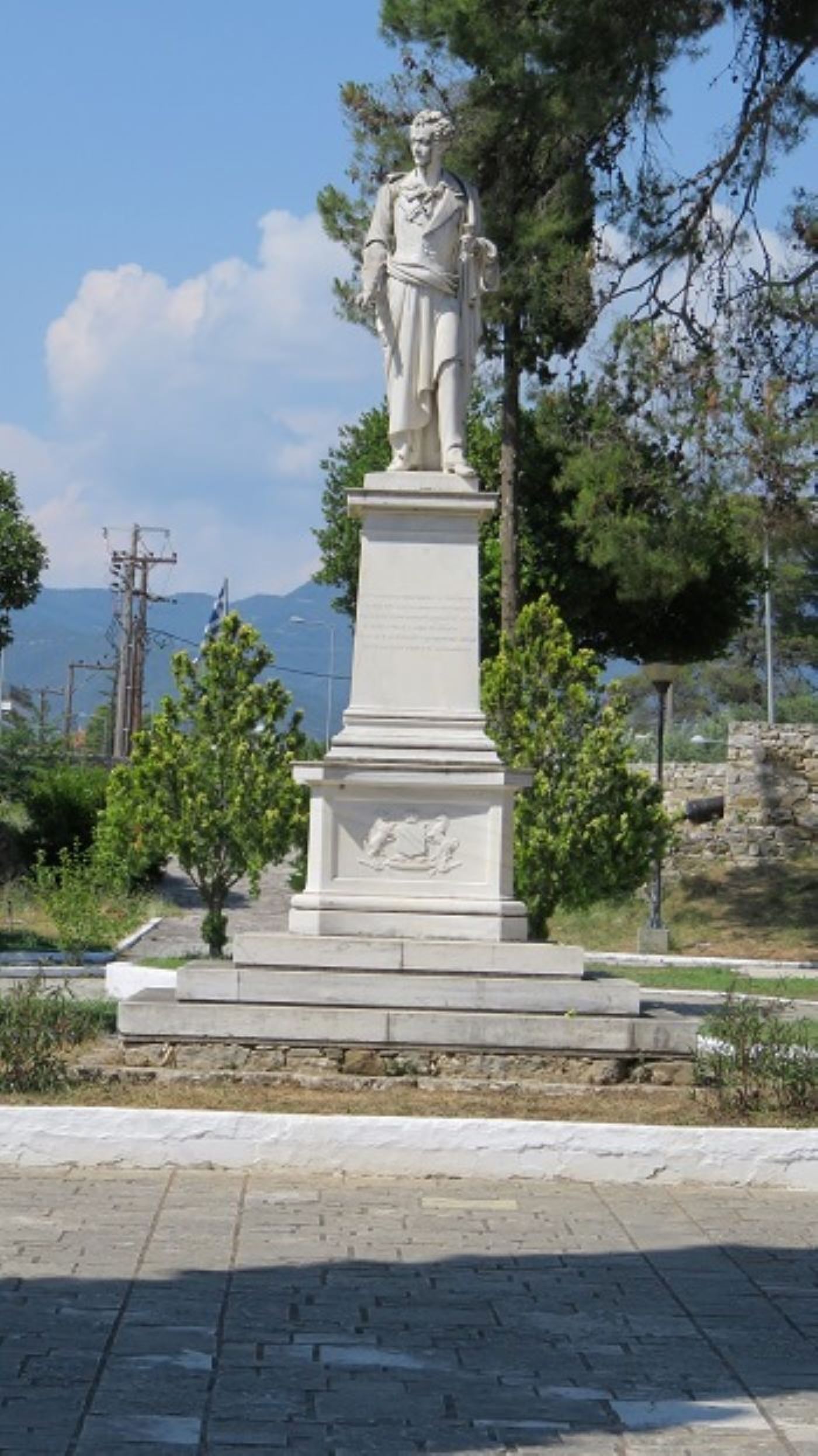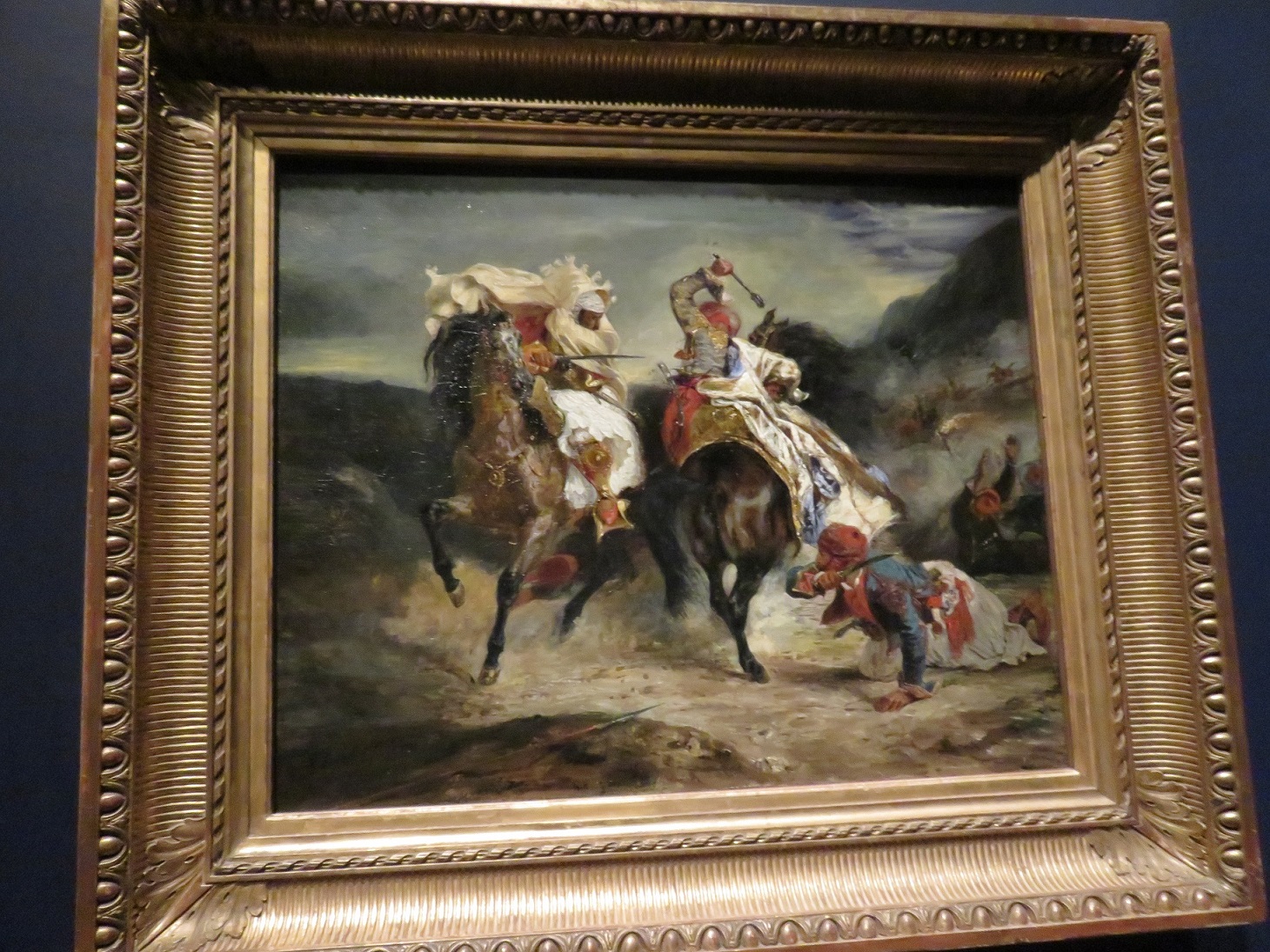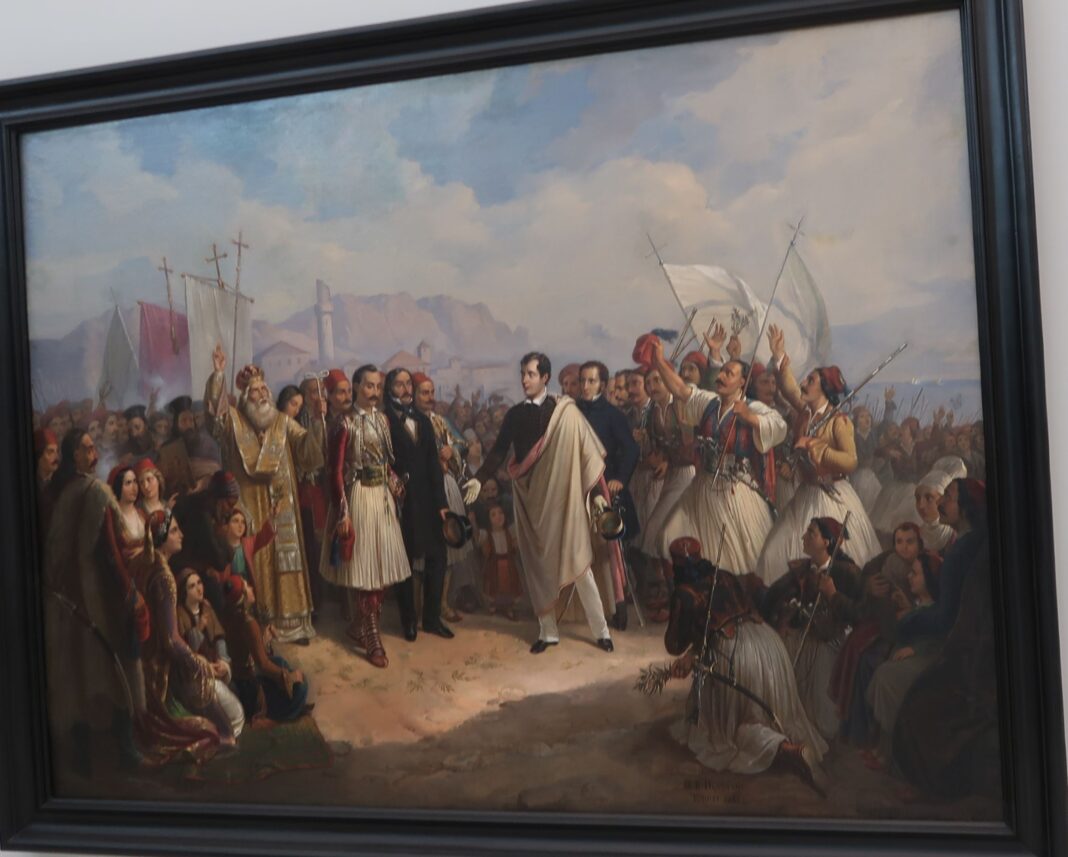By Catherine Tsounis
April 19th is the 200th anniversary of George Gordon, Lord Byron’s death. Why should we remember an English poet? He was one of the greatest Romantic poets in history. His poetry and plays have mesmerized generations of readers. Lord Byron inspired Western civilization to fight for the rights of oppressed people, in particular Greece.
A famous poem is “She Walk in Beauty.” The poem opens:
“She walks in beauty, like the night
Of cloudless climes and starry skies;
And all that’s best of dark and bright
Meet in her aspect and her eyes;
Thus mellowed to that tender light
Which heaven to gaudy day denies.” 1
Eugene Delacroix, the greatest Romantic era artist, was above all a Phil-Hellene influenced by Lord Gordon Byron’s works,
“The Garden of Heroes” is not on the Beaten Trail of recommended Greek sites by excursion agencies. I went with Kapogiannis Tours of Tripoli to discover the Greek Soul of Independence on an excursion with guide Kostoula. It is located at the entrance of Missolonghi. The Garden has a large section dedicated to the fighters of the Greek War of Independence, who fought for the freedom of Missolonghi. I was impressed with a marble statue of the great poet Byron, above the place where his heart is buried. Lord Byron died in Missolonghi on April 19th,1824, during the second siege of the town. His heart was buried in Missolonghi. Every year, on Palm Sunday there is a Memorial March. The march starts from the church of Agios Spyridon and ends in the Garden of the Heroes.2
In 1823, there was a sharp decline in American interest in the Greek cause, because of a civil war among leaders. At the end of 1823, Lord Byron embraced the Greek cause, arriving at Missolonghi. From this moment, Pan Hellenism became strong. It was unquestioned in the United States, Europe, and elsewhere. Byron’s sacrificial death in the first siege of Missolonghi influenced Greek Independence.

Before the national uprising, Greeks were hardly known. “It must be remembered that after four centuries of Turkish rule or misrule, Greece had sunk so low a level that she excited no interest abroad, beyond the pitiful belief that the Hellenic spirit had expired in dust and ashes affording no hope of future resurrection.3 The American people offered their enthusiastic support. The United States government was cautious as the Greeks were recovering their freedom. Lorn Byron’s support inspiring Eugene Delacroix’s art shaped public opinion. In addition, Ibrahim Pashas, an Islamized Greek ruler of Egypt with his genocidal Egyptian forces, promoted negative public opinion towards the Ottoman power: a government that won battles through ethnic cleansing of Eastern Orthodox Christians. The European public applied pressure on their governments to free Greece.
“On This Day I complete my 36th Year,” a poem by Lord Byron, is one of the masterpieces of English literature. George Gordon, Lord Byron, composed it privately in his journal when he was preparing to join the Greek War of Independence in 1824. He renounced his youth, choosing self-sacrifice for the Greek cause of Independence, believing “ “They never fail who die in a great cause.”
Basically, the poem says, in simple words “the sword, the flag, the battlefield, Glory and Greece are around us! The dead Spartan carried on his shield was not more free than I…you look back on your youth with regret, why bother living? This is the land of honorable death: go to the battlefield and die for the cause.”5.
Greeks and their descendants are free because of the sacrifice of a man who had it all: Lord Gordon Byron. Looking at the history of Eastern Orthodox communities of Europe, Asia, and Africa, I realize the significance of what Lord Byron did for all. In 2021, official documents reveal, he gave part of his fortune to create a modern Greece. Lord Gordon Byron is the real spiritual and economic savior of Greece, inspiring England, France, and Russia to come at the last moment to save the revolution at Navarino. His letters and official documents from the March 1976 “Pilgrimage” magazine and www.Guardian.com present an image of a patriot, who did not join factions, but created a nation.
Byronism or Byron’s poetry was the major force in the 1800’s. Byron’s reform and liberalism found a place in America. Greek classical scholarship was the same in England and America. Lord Byron after the war, wanted the Greeks to “.invest me with the character of their ambassador or agent: I will go to the United States, and procure that free and enlightened government, to set the example of recognizing the Federation of Greece, as an independent state. This done England must follow the example and then the fate of 4great commonwealth of Christian Europe.”
His death shocked America and Europe. Magazines, such as the North American Review has a 50 page review of his poems. His poetry increased in popularity after his death in Missolonghi. American Philhellenes Edward Everett, Thomas Jefferson, Daniel Webster, Jarvis, Miller Howe and others kept the American interest alive after Byron’s death. Sympathy expressed in the Monroe Doctrine did not result in military aid.
“I have given her [Greece] my time, my means, my health,” he is recorded as saying in a moment of lucidity. “And now I give her my life! What could I do more? Aa banknote unearthed by the Observer in the country’s state archives 2021sheds new light on the poet’s fabled generosity. It also offers indelible proof of his commitment to the Greek cause.

In the cheque Byron stipulates that £4,000 – roughly £332,000 today ( 425,258.80) – be paid to Giovanni Orlando, a representative of the provisional government that, alarmed by the way the war was going, had approached the British peer for funds The money was to go towards emergency needs – notably financing a fleet to defend Missolonghi from besieging Ottoman Albanians. Both sides agreed it would be repaid against a much bigger loan to be raised in London where Orlando was headed. unnoticed in the country’s archives for years. The money funded a squadron of 14 vessels, nine Hydriot and five Speziot, put into sea action.”
Roderick Beaton, emeritus professor of modern Greek studies at King’s College London, explained “Greece did not follow the example of other parts of the Ottoman Empire that became nominally independent, but were run by local warlords…But Byron’s willingness to part with such a large slice of his personal fortune also had an immediate impact – one that Beaton believes helped change the course of events.
“His financial contribution was crucial,” said Beaton in his book, Byron’s War. “No historian of the war has really paid attention to this fact. The Ottoman Albanian troops who were besieging Missolonghi suddenly disappeared as soon as word got out that Byron had lent this money and the fleet was sailing out of Hydra and Spetses.”6.
Byron’s loan, combined with a loan later raised in London, had the effect of “tipping the scales crucially in favor of the elected Greek government and against the warlords.” On the 200th Anniversary of Lord Byron’s death, we must remember him. He who had it all, giving up wealth and life. His heroic sacrifice inspired the creation of modern Greece.
Special Appreciation to our friends Erica and Doris for their assistance. All photos by Catherine Tsounis
References:
1 George Gordon, Lord Byron. “She Walks in Beauty” from Hebrew Melodies. London: John Murray, 1832-33. Public Domain.
2. https://hellenicnews.com/on-the-road-in-greece-the-garden-of-heroes-missolonghi/
3. https://hellenicnews.com/tracing-american-philhellenism-at-the-200th-anniversary-of-greek-independence/
4. https://www.greeknewsusa.com/remembering-the-200th-anniversary-of-the-1821-greek-revolution-ibrahim-pasha-and-mystra/
5. https://www.litcharts.com/poetry/lord-byron/on-this-day-i-complete-my-thirty-sixth-year
6. https://greekamericanexperience.wordpress.com/2021/07/09/remembering-the-200th-anniversary-of-greek-independence-lord-gordon-byrons-sacrifice/
7. https://www.theguardian.com/books/2021/apr/18/revealed-lord-byrons-4000-cheque-that-helped-create-modern-greece







